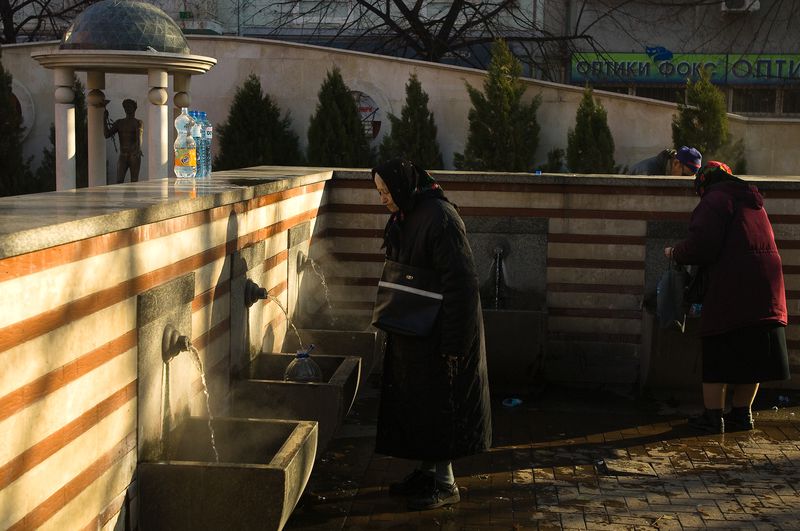Do Your Share so That …Brussels May Help You*
Elitsa Zlateva, February 13, 2012
 The interaction between Bulgaria and the European Union related to the country’s problems with the judiciary features remarkable stability. For the last 15 years Sofia’s work in the field was assessed exactly 20 times and the European Commission had not been given even one chance to amend its initial opinion. The need for judicial reform, fight against corruption and organised crime ran like a red thread through all those reports to tumble down like a tangle in the latest - tenth in a row - report under the Cooperation and Verification Mechanism (CVM).
The interaction between Bulgaria and the European Union related to the country’s problems with the judiciary features remarkable stability. For the last 15 years Sofia’s work in the field was assessed exactly 20 times and the European Commission had not been given even one chance to amend its initial opinion. The need for judicial reform, fight against corruption and organised crime ran like a red thread through all those reports to tumble down like a tangle in the latest - tenth in a row - report under the Cooperation and Verification Mechanism (CVM).
The fact that in its fifth year as full EU member Bulgaria continues to struggle with problems from back before accession is alarming by itself. Recently, however, the situation grew even more disturbing with the attention starting to focus on the apparent inability of the Commission to challenge a country's stubborn negligence of most implicit EU standards with something more than verbal pressure.
Against this background the issue about the continuation, possible removal, and overall benefits of the CVM is neither technical, nor insignificant. It gives rise to unpleasant conclusions that will haunt with frustration the Sofia-Brussels axis for long time ahead.
Bulgaria on EU’s family photo
Leaning back on the laurels of its full EU membership for half a decade already, Bulgaria carelessly neglects the bigger picture. There, it is clearly shown that the country’s integration into the EU is far from finished. The Cooperation and Verification Mechanism is just one of EU’s delicate ways to post constant reminders about this.
The rest is presented in dozens of sector studies, recommendations and strategies that synchronise the co-existence of the 27 member states. Unlike the CVM with its straight criticism and intentional publicity to add a meaningful touch, the conclusions in the other documents are implied by statistical data and expert analyses. Therefore, they only occasionally emerge in the spotlight.
Let us have a peek, for instance, into a summarised evaluation – the Council  recommendations on the National Reform Programme and the Convergence programme of Bulgaria for 2011. This new tool in EU’s economic governance efforts was introduced only last year.
recommendations on the National Reform Programme and the Convergence programme of Bulgaria for 2011. This new tool in EU’s economic governance efforts was introduced only last year.
The revealed portrait of Bulgaria is devastating: a 46% share of long-term unemployment; youth activity rate that has consistently stayed at less than two thirds of EU average (2009: 29,5 %; EU: 43,8 %); Bulgaria also has the highest share of young people who are neither in education nor in employment (19,5 % of people aged 15-24); 41,9 % of its population experience severe material deprivation as compared to 8,1 % average for EU. The inefficiency and non-transparency of the public sector is heavily emphasised and a big attention mark is put on the disastrous productivity level and the urgent need for educational reform and a reform of the pension system.
Against this background, the CVM ceases to look like an annoying stain over the painted in pink front face of Bulgaria’s EU membership and starts to seem more like the top of an iceberg that it really is. Indeed, it is ridiculous to expect that no one in Brussels will notice the link between the CVM-monitored problems and the unemployment, the illiteracy, the administrative negligence, the lack of infrastructure and poverty. It would be also unwise to believe that being entangled in the debt crisis the EU would choose to ignore the wanderings of a small, poor and ill-managed country and will continue carrying it on its back.
The little suspense left in the constant EU monitoring over Bulgaria is based precisely on the insecurity about the next Brussels move along the line of the counteraction to the country’s voluntary entrenchment in Europe's periphery. The CVM’s removal on which Bulgarian government insists so much is surely not on the agenda. A sign of support for this is the narrowing of the focus of the reports on certain details – such as particular laws, procedures, events and even persons. As a matter of fact, precisely the crisis in Europe acts to increase Brussels’s intolerance against any deviation from the rules.
The true target of the reports
The continuation of the monitoring assigns the Commission with the urgent task to find a way to finally wrench out results from the CVM. The comments about CVM’s inefficiency are usually being averted by Commission’s spokespersons with the remark that the Mechanism has exerted pressure for reforms that otherwise would have not happened. The hidden truth is that Sofia's reform resistance brought before the European administration an unknown and unforeseen challenge.
Together with the judicial monitoring that seems to remain unique in enlargement history, let us recall the expressly invented for Bulgaria and Romania safeguard clause in the judiciary. Another precedent was the 2008 extraordinary report on the EU funds management in Bulgaria. In the same period, the country was practically thrown out of Europe's structural financing for almost a year – a third never seen measure. It has to be admitted that the gravity of the precedents that Bulgaria managed to inspire during its short stay in the EU exceeds many times its absolute weight in the Union.
As a matter of fact, those exceptional measures were targeted not so much at the unresolved issues in a particular field (the judiciary) but rather at a specific - and surprisingly persistent in the eyes of the European partners - mindset. The unshakable inertness and amorphous stir which Sofia opposed to the benevolent advises of its partners – and against its own national interests – continue to confuse Europe. It is not advisable, however, to expect that Brussels will hang for long in the dead ends where it was led by the Bulgarian negligence.
Counting of the “Brussels’s sticks”
Bulgaria urgently needs to come to the insight that the EU is beginning to adapt to its particularities. Therefore, consequently, the EU institutions will continue to look for options to increase the pressure. Finally, from now on the “carrot or stick” dilemma will emerge more and more rarely in EU's agenda on Sofia.
The only consolation for Bulgaria from now on will be that it will be saved from the shame of direct sanctions under the CVM. While presenting the latest CVM report, the Commission’s spokesman Mark Gray pointed out that there was no legal provision to impose sanctions because of the unfulfilled recommendations under the Mechanism.
The “Brussels’ stick”, however, can strike in many different ways. An option that is obviously being checked out is the potential discrete linking of the CVM with some sort of indirect punishment. Those intentions are revealed through the current stalemate with the Schengen entry of Bulgaria and Romania, despite the fact that the two countries have fulfilled the technical requirements. On the other hand, the indirect sanctions option shows so far at least two disadvantages – it dilutes the pressure and allows for active contest of the measures - just as Bulgaria does against the Netherlands’ arguments to block the way to Schengen.
Thereby, the only palpable option left to increase the effects of the CVM is by strengthening control and co-operation with the Bulgarian institutions. The solution may look harmless only at first glance but it will in no way signify helplessness from the side of the Commission. Practically, it means longer and more frequent inspections and more publicity to the dialogue between the EU and the Bulgarian institutions. By the way, the dialogue transparency as a tool for increasing the pressure could be a very powerful instrument ahead of the 2013 parliamentary elections in Bulgaria.
 Brussels holds another powerful instrument for indirect pressure – the European funds. Despite that for the structure and functioning of the judiciary there is no universal EU manual, the mismanagement of EU money (or the mere suspicion for mismanagement) is something to which the Commission is entitled to react immediately. A similar scenario was tested in 2008–2009 on the occasion of the crisis with the management of the EU funds and it produced rather satisfactory results.
Brussels holds another powerful instrument for indirect pressure – the European funds. Despite that for the structure and functioning of the judiciary there is no universal EU manual, the mismanagement of EU money (or the mere suspicion for mismanagement) is something to which the Commission is entitled to react immediately. A similar scenario was tested in 2008–2009 on the occasion of the crisis with the management of the EU funds and it produced rather satisfactory results.
CVM and Europe's progress
The CVM experience equipped EU with an experience that could be valuable even in a broader context. Though in a much smaller scale, this experience confirmed one of the main lessons after the debt crisis: that the voluntary respect of the EU rules should not be trusted too much. Indeed, during the last couple of years the EU started to act through less recommendations and more regulation.
The flexibility of the EU institutions to invent original solutions to specific challenges has also increased. Instead of going through common strategies, EU is accustoming itself to working under individual terms with the member states. In the case of Bulgaria this is the constant monitoring, in the case of Greece it is the brutal imposition of a rescue package, in the case of Italy – partners’ co-operation etc. The individual approach underpins also EU’s development strategy “Europe 2020”, where the priorities for each country are customised and follow individual control schedules.
If we extend the picture even more, we will see that precisely the customisation of the interaction between Brussels and the member states is the big change brought to Europe by the Eastern enlargement. This surely improves the capability of the Union to act even in its external affairs – for instance, in the relations with the neighbouring countries and regions such as the Eastern partnership but possibly also the countries from the “Arab spring”.
Bulgaria’s unexpected contribution to that context is, of course, not a thing to be proud with. A reason for pride could be, for instance, if the country would leave the bottom of the charts for living standard and quality of life in the EU. To this end, however, the incidental fixation on the commas in the next reports will not help. Nor would inaction that - judging from the behaviour of Bulgarian institutions – should be the best insurance against mistakes. But it is certain that with or without the reports, a certain work must finally be done. Not because of Europe's demands, but because the thoughtfulness and the responsibility for the future have no starting and end date.
 Entrance to the Berlaymont building | © EC - Audiovisual Service
Entrance to the Berlaymont building | © EC - Audiovisual Service | © European Union 2020, EC - Audiovisual Service
| © European Union 2020, EC - Audiovisual Service Commission President Ursula von der Leyen | © European Union 2019 - Source: EP
Commission President Ursula von der Leyen | © European Union 2019 - Source: EP | © European Union
| © European Union | © euinside
| © euinside | © EU
| © EU